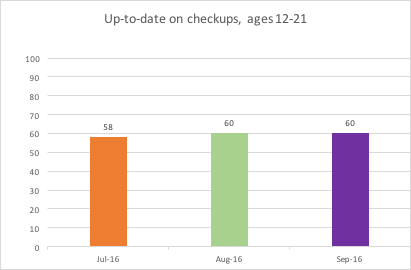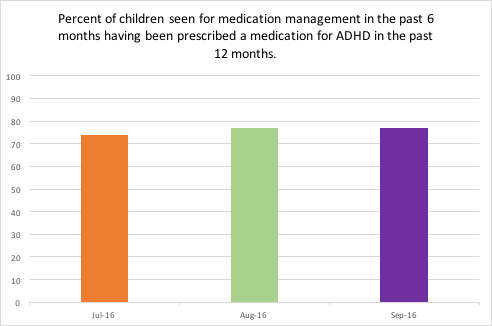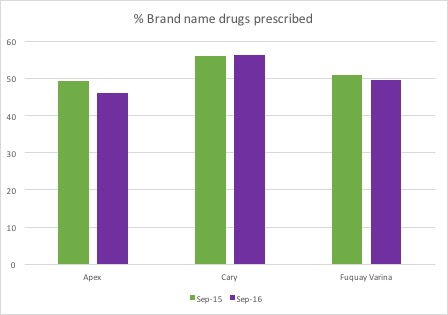Reach Out and Read
We are incredibly excited in 2019 to be partnering with Reach Out and Read and to provide new books to children at their checkups from ages 6 months to 5 years of age. Like Reach Out and Read says, ‘We encourage parents to read aloud daily to their infants, toddlers and preschoolers, as a simple and effective way of fostering nurturing, language-rich family interactions that support brain development and provide a foundation for success.”

Reliable Web Sites
- Reach Out and Read
Reach out and Read homepage - Reading Tips
Reach Out and Read- Reading Tips
Dental Fluoride
Dental caries are a significant problem for children. The risk of developing caries can be decreased by using fluoride. In 2014, the American Academy of Pediatrics issued a policy recommending fluoride treatments for babies. In our office, we apply topical fluoride every 3-6 months starting when the first tooth erupts. During all of your well child checks, we also address dental health and proper dental care that is age appropriate. We also will recommend home treatment with fluoride supplements when medically necessary.
Reliable Web Sites
- AAP Policy Statement
Most recent AAP policy statement on dental varnish
Nurse Triage
Need advice from a nurse? Our highly trained nursing staff is available to answer your questions and concerns 24 hours a day. Each day our nurses provide advice on a wide range of topics from fevers, respiratory problems, to medication dosing. During business hours, our experienced in house nurses will be answering your concerns. Each of our LPNs and RNs take turns providing advice. After hours, we have contracted with WakeMed to provide nurse advice.
Track Rx
We are excited to have partnered with Kids in Parks and Walk with a Doc starting in the Summer of 2017. Kids in Parks is an exciting organization that has created a network of trails throughout the area with self-guided brochures that teach kids about nature while being outside. The Walk with a Doc organization works with local doctors to encourage behavior change and healthy living by connecting the physician with their patients outside of the office. The support of these organizations is amazing. Every few months we organize to have several of our doctors, nurse practitioners, nurses, and administrative staff come together for a hike. We invite our patients an their families to join us. The hikes are so much fun and our families love them. Another great aspect about Kids in Parks is that children earn prizes for tracking their adventures outside! You can sign up on their website http://www.kidsinparks.com.
Reliable Web Sites
Medication Dosing
Easily determine the right dose of Acetaminophen (Tylenol) or Ibuprofen (Motrin, Advil) for your infant or child’s weight. If your child is less than 2 months old and has a fever >100.4, please call our office prior to giving any medications.
For infants under 6 pounds, check with your doctor.
| Child's Weight | Medication | Dose |
|---|---|---|
| 6-11 lbs | Acetaminophen Syrup 160 mg/5mL (such as Children’s Tylenol Oral Suspension) | 1.25 mL |
| 12-17 lbs | Acetaminophen Syrup 160 mg/5mL (such as Children’s Tylenol Oral Suspension) | 2.5 mL |
| 12-17 lbs | Ibuprofen Infant Drops 50 mg/1.25 mL (such as Infant’s Motrin Oral Suspension Drops) | 1.25 mL |
| 12-17 lbs | Ibuprofen Liquid 100 mg/5 mL (such as Children’s Motrin Oral Suspension) | 2.5 mL |
| 18-23 lbs | Acetaminophen Syrup 160 mg/5mL (such as Children’s Tylenol Oral Suspension) | 3.75 mL |
| 18-23 lbs | Ibuprofen Infant Drops 50 mg/1.25 mL (such as Infant’s Motrin Oral Suspension Drops) | 1.875 mL |
| 18-23 lbs | Ibuprofen Liquid 100 mg/5 mL (such as Children’s Motrin Oral Suspension) | 4 mL |
| 24-35 lbs | Acetaminophen Syrup 160 mg/5mL (such as Children’s Tylenol Oral Suspension) | 5 mL |
| 24-35 lbs | Chewable Acetaminophen Tablets 160 mg (such as Children’s Tylenol Chewable Tablets) | 1 tablet |
| 24-35 lbs | Ibuprofen Infant Drops 50 mg/1.25 mL (such as Infant’s Motrin Oral Suspension Drops) | 2.5 mL |
| 24-35 lbs | Ibuprofen Liquid 100 mg/5 mL (such as Children’s Motrin Oral Suspension) | 5 mL |
| 36-47 lbs | Acetaminophen Syrup 160 mg/5mL (such as Children’s Tylenol Oral Suspension) | 7.5 mL |
| 36-47 lbs | Chewable Acetaminophen Tablets 160 mg (such as Children’s Tylenol Chewable Tablets) | 1.5 tablets |
| 36-47 lbs | Ibuprofen Infant Drops 50 mg/1.25 mL (such as Infant’s Motrin Oral Suspension Drops) | 3.75 mL |
| 36-47 lbs | Ibuprofen Liquid 100 mg/5 mL (such as Children’s Motrin Oral Suspension) | 7.5 mL |
| 48-59 lbs | Acetaminophen Syrup 160 mg/5mL (such as Children’s Tylenol Oral Suspension) | 10 mL |
| 48-59 lbs | Chewable Acetaminophen Tablets 160 mg (such as Children’s Tylenol Chewable Tablets) | 2 tablets |
| 48-59 lbs | Adult Acetaminophen Tablets 325 mg (such as Tylenol Regular Strength) | 1 tablet |
| 48-59 lbs | Ibuprofen Infant Drops 50 mg/1.25 mL (such as Infant’s Motrin Oral Suspension Drops) | 5 mL |
| 48-59 lbs | Ibuprofen Liquid 100 mg/5 mL (such as Children’s Motrin Oral Suspension) | 10 mL |
| 48-59 lbs | Chewable Ibuprofin Tablets 100 mg (such as Children’s Motrin Chewables) | 2 tablets |
| 48-59 lbs | Adult Ibuprofen Tablets 200 mg (such as Motrin IB or Advil) | 1 tablet |
| 60-71 lbs | Acetaminophen Syrup 160 mg/5mL (such as Children’s Tylenol Oral Suspension) | 12.5 mL |
| 60-71 lbs | Chewable Acetaminophen Tablets 160 mg (such as Children’s Tylenol Chewable Tablets) | 2.5 tablets |
| 60-71 lbs | Adult Acetaminophen Tablets 325 mg (such as Tylenol Regular Strength) | 1 tablet |
| 60-71 lbs | Ibuprofen Liquid 100 mg/5 mL (such as Children’s Motrin Oral Suspension) | 12.5 mL |
| 60-71 lbs | Chewable Ibuprofin Tablets 100 mg (such as Children’s Motrin Chewables) | 2.5 tablets |
| 60-71 lbs | Adult Ibuprofen Tablets 200 mg (such as Motrin IB or Advil) | 1 tablet |
| 72-95 lbs | Acetaminophen Syrup 160 mg/5mL (such as Children’s Tylenol Oral Suspension) | 15 mL |
| 72-95 lbs | Chewable Acetaminophen Tablets 160 mg (such as Children’s Tylenol Chewable Tablets) | 3 tablets |
| 72-95 lbs | Adult Acetaminophen Tablets 325 mg (such as Tylenol Regular Strength) | 1.5 tablets |
| 72-95 lbs | Ibuprofen Liquid 100 mg/5 mL (such as Children’s Motrin Oral Suspension) | 15 mL |
| 72-95 lbs | Chewable Ibuprofin Tablets 100 mg (such as Children’s Motrin Chewables) | 3 tablets |
| 72-95 lbs | Adult Ibuprofen Tablets 200 mg (such as Motrin IB or Advil) | 1.5 tablets |
| 96 lbs or more | Adult Acetaminophen Tablets 325 mg (such as Tylenol Regular Strength) | 2 tablets |
| 96 lbs or more | Ibuprofen Liquid 100 mg/5 mL (such as Children’s Motrin Oral Suspension) | 20 mL |
| 96 lbs or more | Chewable Ibuprofin Tablets 100 mg (such as Children’s Motrin Chewables) | 4 tablets |
| 96 lbs or more | Adult Ibuprofen Tablets 200 mg (such as Motrin IB or Advil) | 2 tablets |
Important Instructions for Proper Use
- Always read and follow the label instructions.
- Use only the dosing device that came with the product.
Acetaminophen (Tylenol)
- Repeat dose every 4-6 hours while symptoms last.
- Do not give more than 5 doses in 24 hours.
- Do not use with any other product containing acetaminophen.
Ibuprofen (Advil, Motrin)
- Not for use with children under 6 months of age.
- Repeat dose every 6-8 hours as needed.
- Do not give more than 4 doses in 24 hours.
Practice Improvement
In an ongoing effort to improve the care we give our patients and their families, Cary Pediatrics is engaged in a number of projects to look at our practice. Some of these involve our clinical decision making and following clinical guidelines, and some with patient satisfaction.
What have we learned?
Staying on schedule
We are pleased that patients are happy with our practice, and would refer others to see us. But we have heard that our biggest barrier is time waiting in the office to be seen. We have worked with our scheduling staff to ensure that appointments that are made have enough time to discuss the concerns the parents have. We are also working on streamlining the use of our EHR to expedite orders and the gathering of information. We also could use your help: when you call to make an appointment, either a sick visit or a checkup, if you have specific questions or concerns that may require a prolonged visit with your provider, please let us know beforehand, so we can budget time, and be able to give your child as much time as they need, and help keep us on schedule.
Building relationships with a primary provider to address special needs
We also learned that we are doing a good job with having patients with special health care needs see their primary provider, to ensure consistency and continuity of care. But we also see that we can do better. We have highlighted in our scheduling programs and in our EHR a primary provider for patients with special needs. In this way, we should be able to do even better maintaining that important relationship. Below, blue means a patient saw their primary provider.
We are proud that all three of our office are performing similarly, showing we are all on the “same page” in our approach to our patients.
How are we performing?
When you are seeing your provider, you might also hear us mention things like “it is recommended that…” or “guidelines or the American Academy of Pediatrics suggest…” We do our best identifying areas of our practice that have been identified by national agencies as areas of emphasis to improve care, both in the short term and in the long term.
Examples in the past year or two include: following industry standards in vision screening in younger children; cholesterol screening in school-aged children; immunizing children, especially those with asthma against influenza; maintaining appropriate appointment schedules for children on chronic medications; tracking newborn screening to ensure complete results; keeping kids on schedule for their yearly checkups.
We also try to review the medications that we are prescribing. For example we know that cost is very important to parents when it comes to medical care. We also know that generic medications tend to cost less than brand name medications. Unfortunately prescribing generic medications is not always possible, but we want to keep the percentage of generic medications as high as possible while prescribing the best and most effective medications for the patients. Below is the percent of brand name medications we have prescribed for the month of September the past two years.
Continuously Improving
We strive to continuously improve our practice by reviewing current literature and practicing evidence based medicine. The providers meet frequently throughout the year to discuss the latest literature to ensure that we are all practicing up to date medicine.
We also actively seek feedback from our patients at regular intervals. Formally, we will send out surveys via email after visits for our patients to give us feedback. Our questions on the surveys will change depending on our goals, but mostly involve making sure you were satisfied with all aspects of your visit from making the appointment, to your time with your nurse, and the time with you spent with the provider. We use this feedback to make changes in our workflow and procedures. Listening to our patients is one of our most important goals, so that we can provide the best care and service to our patients.




